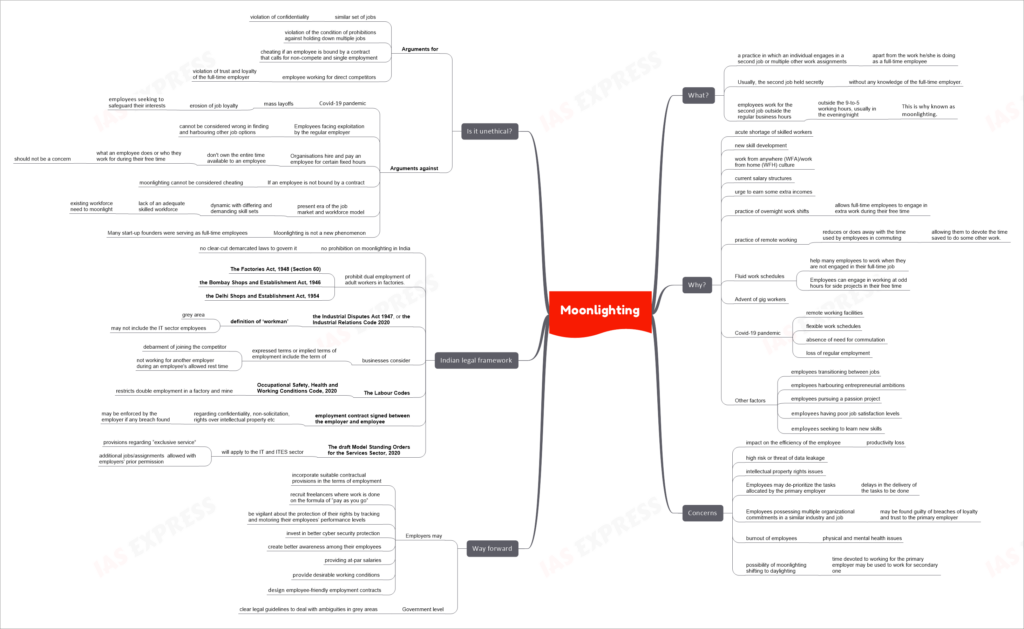Moonlighting – Concerns, Ethics and Indian Legal Framework

From Current Affairs Notes for UPSC » Editorials & In-depths » This topic
IAS EXPRESS Vs UPSC Prelims 2024: 85+ questions reflected
Recently, Indian IT services giant Wipro sacked 300 employees after discovering that they were working for its major competitors simultaneously, which is termed moonlighting. The company raised concerns regarding this practice and termed it as a complete violation of integrity “in its deepest form”. Many other companies are coming forward in support of Wipro’s decision calling it unethical, cheating and a violation of integrity. However, the issue has several layers in it that need to be examined.

What is moonlighting?
- It is a practice in which an individual engages in a second job or multiple other work assignments apart from the work he/she is doing as a full-time employee.
- Usually, a full-time employee holds the second job secretly i.e., without any knowledge of the full-time employer.
- The employees work for the second job outside the regular business hours i.e., outside the 9-to-5 working hours, usually in the evening/night. Since the employees do this extra work usually in the evening/night, this practice is known as moonlighting.
- Individuals engage in such practices to earn extra money outside their regular job that they are holding as full-time employees.
Why moonlighting?
- The acute shortage of skilled workers, new skill development, work from anywhere (WFA)/work from home (WFH) culture, current salary structures and the urge to earn some extra income are some major factors contributing to the surge in moonlighting in recent days.
- Furthermore, the practice of overnight work shifts allows full-time employees to engage in extra work during their free time.
- Similarly, the practice of remote working reduces or does away with the time used by employees in commuting allowing them to devote the time saved to do some other work.
- Fluid work schedules also help many employees to work when they are not engaged in their full-time job. Employees can engage in working at odd hours for side projects in their free time.
- The advent of gig workers especially during the Covid-19 pandemic further gave a boost to this practice. Gig workers left no opportunity to grab projects of short duration to supplement their regular income.
- The Covid-19 pandemic with its remote working facilities, flexible work schedules, absence of need for commutation and loss of regular employment further helped in the growing practice of moonlighting.
- Certain other factors that are contributing to this practice are when employees are transitioning between jobs, harbouring entrepreneurial ambitions, pursuing a passion project, having poor job satisfaction levels or seeking to learn new skills to stay relevant in the current dynamic and unpredictable job market.
Concerns
Businesses and companies are not in favour of such practices fearing this may adversely impact the business, their clients, their business partners and other stakeholders on the following grounds:
- This may have an impact on the efficiency of the employee and lead to productivity loss.
- There is a high risk or threat of data leakage and intellectual property rights issues concerning clients, organizations, PII (personally identifiable information) and business partners.
- Employees engaged in multiple tasks and working for multiple recruiters may de-prioritize the tasks allocated by the primary employer leading to delays in the delivery of the tasks to be done.
- Employees possessing multiple organizational commitments in a similar industry and job may be found guilty of breaches of loyalty and trust to the primary employer.
- It may lead to the burnout of employees leading to physical and mental health issues.
- The possibility of moonlighting shifting to daylighting, i.e., employees may engage in working for the secondary employer during the time devoted to working for the primary employer.
Is it unethical then?
- Arguments for
- A person working with a similar set of jobs could give rise to concerns about a violation of confidentiality since many employers bind their employees by placing certain restrictions on employees in their agreements.
- Moonlighting may be considered a violation of the condition of prohibitions against holding down multiple jobs often placed by the employer on their employees.
- It can be considered cheating if an employee is bound by a contract that calls for non-compete and single employment, which is the case in the majority of conventional employment contracts.
- Furthermore, if a full-time employee is working for direct competitors of the primary employer, then it may be considered a violation of the trust and loyalty of the full-time employer.
- Arguments against
- Moonlighting cannot be termed unethical since the pandemic has shown how full-time employees were laid off by their employers threatening their job and financial security.
- The mass layoffs by organisations during the pandemic lead to the erosion of job loyalty forcing employees to safeguard their interests.
- Employees facing exploitation by the regular employer in the form of low salaries (sub-par wages), overtime without payment, and unsatisfactory working conditions cannot be considered wrong in finding and harbouring other job options.
- Organisations hire and pay an employee for certain fixed hours. They don’t own the entire time available to an employee. Thus, what an employee does or who they work for during their free time should not be a concern to their employers.
- If an employee is not bound by a contract that calls for non-compete and single employment providing certain relaxations then moonlighting cannot be considered cheating.
- The present era of the job market and workforce model is dynamic with differing and demanding skill sets and the lack of an adequate skilled workforce may require the existing workforce to moonlight.
- The future workforce model will be a group of people working as consultants and designing products for companies as collaborative groups and they may do it for several different companies simultaneously.
- Moonlighting is not a new phenomenon. It was there for ages. Many start-up founders were serving as full-time employees while exploring the prospects of setting up new ventures.
- Moonlighting cannot be termed unethical since the pandemic has shown how full-time employees were laid off by their employers threatening their job and financial security.
Indian legal framework
Moonlighting is not a new concept in India. Dual employment and moonlighting were quite rampant, especially in industrial towns. There is no prohibition on moonlighting in India and no clear-cut demarcated laws to govern it. However, there are certain laws dealing with dual employment in India. These are:
- The Factories Act, 1948 (Section 60), the Bombay Shops and Establishment Act, 1946 and the Delhi Shops and Establishment Act, 1954 prohibit dual employment of adult workers in factories.
- The definition of ‘workman’ is a grey area which may not include the IT sector employees.
- As per the Industrial Disputes Act 1947, or the Industrial Relations Code 2020, a ‘worker’ means any person employed in any industry to work for a reward, whether the terms of employment be expressed or implied.
- The term ‘workman’ here is exhaustive and includes all workers except for those employed in mainly managerial or administrative, supervisory capacity. However, the inclusion of IT workers under ‘workman’ needs clarity.
- Moreover, businesses consider that the expressed terms or implied terms of employment include the term of debarment of joining the competitor and not working for another employer during an employee’s allowed rest time.
- The Labour Codes in the Occupational Safety, Health and Working Conditions Code, 2020 restricts double employment in a factory and mine.
- The employment contract signed between the employer and employee regarding confidentiality, non-solicitation, rights over intellectual property etc. through which the company’s interest is protected may be enforced by the employer if there is a breach of such restrictive covenants.
- The draft Model Standing Orders for the Services Sector, 2020, which will apply to the IT and ITES sector, has provisions regarding “exclusive service” while allowing employees to take on additional jobs/assignments with their employer’s prior permission.
- However, it also allows employers to prevent employees from working for another employer during the period of their employment by making this a part of their employment contract.
Way Forward
The concerns around moonlighting need to be dealt with on a war footing basis to protect employers’ and employees’ interests. Employers may do this by incorporating suitable contractual provisions in the terms of employment, recruiting freelancers where work is done on the formula of “pay as you go”, adopting such policies where an employee may be allowed to work for another company on the condition of the primary employer be informed about the secondary employment, being vigilant about the protection of their rights by tracking and motoring their employees’ performance levels, investing in better cyber security protection and creating better awareness among their employees. Additionally, employers need to deal with such issues that force employees to go for secondary employment by providing at-par salaries, desirable working conditions and employee-friendly employment contracts. At the Government level, clear legal guidelines are needed to deal with the ambiguities in grey areas. Such changes may make moonlighting appear to be one of the most favourable changes to the job market in the coming time.
Practice Question
Q. Are the existing legal provisions in India adequate to deal with the debate over the practice of moonlighting? What can be done to ensure that it is considered an ethical practice by employers in the coming time?
If you like this post, please share your feedback in the comments section below so that we will upload more posts like this.

